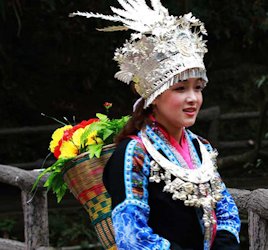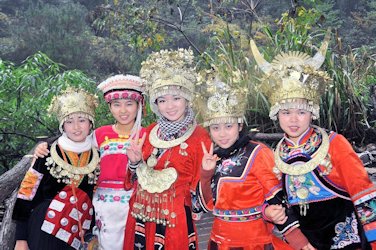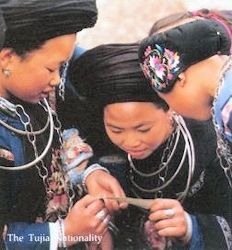|
48. Chinese Nationalities (Tujia Minority) -- Minorities by Alphabetic Sequence |
|||

|

|

|
|
| Tujia Lady | Tujia Ladies | Tujia Ladies | |
|
The Tujia people called themselves "Bizika", which means "native dwellers". Although their name suggests that they are natives, their exact origin is still uncertain. Some people trace their ancestry to the ancient "Ba" people while others claim they come from the Wuman, who moved to western Hunan from Guizhou Province. There are also some that believe that they came from Jiangxi Province at the end of the Tang Dynasty (618-907). The only thing we can be sure of is that the Tujia ethnic group had come into being by the early Five Dynasties period, around the year 910. Some minorities had been so absorbed that their status as separate peoples was nearly lost. The Tujia were not recognized until the 1950s. In many ways they are very similar to the Han people. The Tujia are found in Hunan, and Hubei Provinces. Language The Tujia people have their own language that belongs to the Tibeto-Burman group of the Sino-Tibetan language family. They have no written script and the language of the Han people is in common usage. The language of the Miao ethnic group is also used. Economy The area inhabited by the Tujia people is mostly highland with an altitude ranging between 400 and 1500 meters. Blessed with a mild climate and rich waters, this area provides ideal conditions for the development of forestry, agriculture, fishery and stock rising. Tujia people grow a variety of crops including wet rice, wheat, maize, and sweet potatoes. Other profitable cash crops include sugar beets, ramie, lacquer, cotton, tea, etc. This area also abounds in various timber resources, rare medicinal herbs, minerals, aquatic products and giant salamanders. |
|||
| Return to Alphabetic List On to No. 49 Minority Uyghur ⇨ | |||